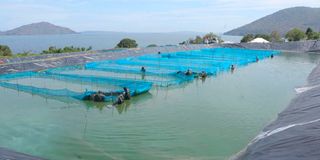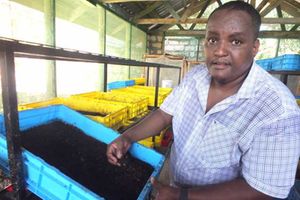
Some of the solar panels used to pump water from Lake Victoria to fish ponds in Ragwe in Suba South in Homa Bay county on March 11, 2025.
John Siambi stands on Sindo-Nyagwethe road in Suba South as he looks at his land on the shores of Lake Victoria.
He smiles, aware that his village will be food secure and farmers will have money in their pockets. Siambi can see his neighbours busy tending to their crops.
What pleases him most is that his four-acre farm sustains the crops grown in the village.
Siambi’s farm is a source of water. From here, water is pumped to the village and used to irrigate fruits and vegetables. The area mostly produces tomatoes and Sukuma wiki.
Until last year, Roo Valley in Suba South constituency was more like a desert. The soil would become hard and dust would cover the village during dry seasons.
Many farmers in Roo Valley depend on rain to produce crops, with a mere handful using petrol pumps to get water from Lake Victoria.
Farming is intense between March and May, during the long rains. After that, the ground becomes bare and brown as almost all vegetation withers.
This is, however, changing with technology introduced by Victory Farms, a leading aquaculture company operating on Roo Beach.
The firm produces fish from cages in Lake Victoria and supplies across the country.
Part of the production is on land where mature fish (brood stocks) produce eggs, which are harvested and taken to a hatchery before being transferred to cages in the lake.
Victory Farms signed agreements with locals who leased their land for the production of eggs.
Ponds were then make on the farms where company employees collect eggs for hatching.
The water from the ponds is used to irrigate farms. Siambi agreed to have his land used in fish production.
“The land would have been idle had I not let Victory Farms use it. Building ponds has been of benefit because farmers now get water throughout the year. The village no longer relies on rain to farm,” he says.
Siambi had not thought of what to do with his land, thanks to the prevailing climatic conditions and hard economic times.
In addition, water from the ponds is rich in nitrogen and other important nutrients, meaning villagers rarely apply fertiliser.
Victory Farms uses solar energy to pump water from the lake, cutting production costs while conserving the environment.

One of the fish ponds used in producing fish eggs in Ragwe, Homa Bay County on March 11, 2025.
Festus Ouma is among the Roo valley residents who took advantage of the project to begin growing tomatoes. Before that, Ouma would only grow maize on his one acre once a year. He practically had no income.
“I would at times plant maize during the short rains in August but the yields was very low,” Ouma says, adding that he now harvests several tonnes of tomatoes every three months.
“The project is lifting many households from poverty. I am a witness of its benefits. The village now has a constant supply of grains, vegetables, fruits and other food,” the farmer says.
This idea of using water from fish ponds to irrigate crops was mooted in January 2023 when Victory Farms was on a growth trajectory.
Company Farm Operations Director, Ntekerei Saruni, says the project – known as Homa Bay Extensive Aquaponics Programme (Heap) – benefits around 100 farmers who get irrigation water directly from the ponds.
Egg production sites named Heap 0,1 and 2, have been set up by the company in Ragwe, Kanyongo and Roo respectively. The three, which are five kilometres apart, have 33 ponds, each measuring 2,400 square metres.
Farmers whose land is directly used for the ponds get royalties from the company. A farmer gets Sh1,900 for every kilo of eggs harvested.
“Many other farmers have expressed interest in the project and will soon be included,” Saruni says.
Building the ponds was the biggest challenge the company and the farmers faced as it involved many approvals from the government and a huge investment in machines. The whole system uses solar energy.
Machine operators cannot rely on the national electricity grid because of frequent power outages. The project is on the farthest corner of Homa Bay County and away from the nearest power station.
Whenever there is power, the voltage is too low to run the machines.
Saruni says company managers took the decision to stick to solar, which is reliable.
“Homa Bay experiences 10 months of sunshine a year, making solar energy the better option in farming. Solar is a one-off investment, with the company just taking care of production costs,” Saruni says.
In Ragwe, where the pilot of the programme was, Victory Farms has installed solar panels that produce 92kw of power and runs a 50kw pump. In Kanyongo, a 94kw solar system runs a 55kw water pump.
Saruni says a pump can supply at least 170 cubic metres (170,000 litres) of water in an hour.
Solar energy is converted to electric current using inverters. It is this current that is used to power the pumps and supply water from the lake to the ponds.
“There are teams that monitor water quality at the ponds and ensure it is within the parameters that fish can grow. They check on water level, Ph, oxygen level and other factors before making a decision on which ponds should be topped, have more water and which ones to remain the same,” he says.
Since installation, the company has not witnessed any breakdown of the solar system.
Saruni says the only problem is when the intensity of the sun falls.
Solar energy goes directly to pumping machines. Power reduces when the sun goes down.
When adding water from the lake to make the environment ideal for fish, some of it drains off. This is what is directed to farms through drip pipes.
The pond water is never redirected to the lake.
“The water from the pond has algae, fish waste, nitrogen and other elements that improve soil health,” Saruni says.
“Farmers using the water say they do not need fertiliser. Many say their yields have improved from the time they were introduced to the project.”
Victory Farms plans to supply water to every farmer in Roo valley and make the entire area green with crops. That, however, will depend on the willingness by farmers to embrace the idea.
Apart from crop growing, the Heap programme has increased fish production at Victory Farms. Saruni says egg production has increased by 40 per cent.
“We supply fish to many parts of the country and feed thousands of families. Our aim is to go beyond East Africa and be number one on the planet,” he says.
“Victory Farms is building a new hatchery to help handle the growing number of eggs.”
Some of the farmers in the programme say they will soon start growing cabbages, carrots and other vegetables. This will be based on agreements they sign with Victory Farms.
Saruni says pieces of land in the project have been leased for 15 years.









